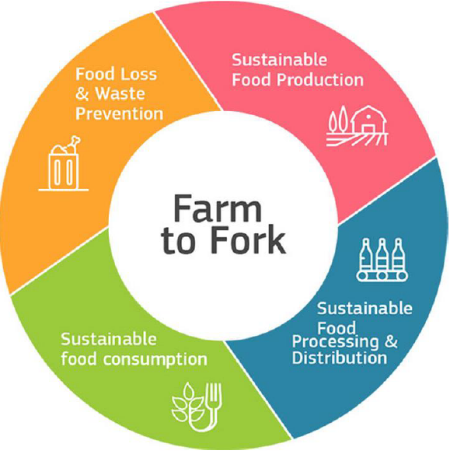ADCATER

Introduction
ADCATER will develop advanced ICT technologies and integrate them into a Smart Food Catering Supply Chain platform that provides: economic efficiencies to growers and suppliers; personalized nutrition accuracy to diners/patrons, wholesalers and caterer; and verification of personal, organizational and global nutritional policies. This will be achieved by harnessing computer vision & deep learning technologies to identify and decode images of prepared food “served to plate before meal” and “left in plate after meal”, applying advanced analytics to derive valuable information such as: served meal ingredients, the degree of adjustment and dietary gaps to the diner profile, batch traceability data, effective and up-to-date nutritional supervision, food waste, and correlation between consumer consumption and health.

Background
Preventing and reducing food waste has become a global priority. One-third of the food produced in the world is wasted every year, 20% of total food produced in the EU lost or wasted, and 43 million people cannot afford a quality meal every second day. Food Processing and Food Services generate almost a third of food waste in Europe (2nd after Households, which generate over 50%).
Catering and Food Services in Healthcare institutions face even greater challenges: plate waste in healthcare facilities (Elderly Houses; Medical Centers) range between 6% - 65%; hospitalized patients continue to suffer from risk of malnutrition resulting from inappropriate food distribution planing and consumption control. The prevalence of malnutrition in the hospitals is close to 35%-40%, causing increased healthcare costs, prolonged length of stay and unfavourable prognosis. More than 40% of the delivered food to patients is not eaten by the patient for various reasons.
While policy makers have addressed the issue of food waste in most sectors, food waste mitigation in Healthcare remains limited. Food services in healthcare must deal with unique challenges:
 Problem #1. Healthcare facilities are required to provide measured amounts of nutrients to a wide variety of clients.
Problem #1. Healthcare facilities are required to provide measured amounts of nutrients to a wide variety of clients.
Problem #2. Diners are not always able/willing to participate in questioners.
Problem #3. Deficiencies in food supply availability are not identified due to lack nutritional measuring structure
Main project activities
- Contribute to Strengthening European research on digitisation in the agri-food system, by grouping relevant expertise coming from 3 different EU MS and one AC, combining research in computer vision and data analysis and gathering (Fraunhofer, IMC, UNIROMA1), operational knowledge on catering supply chain (FoodFix), and nutritional data and measurement capabilities (Hebrew University);
- Realise the potential of ICT and digital technologies to share data throughout the food value chain, by implementing Advanced Food Traceability, connecting all segments of the supply chain, enabling all segments to achieve efficiencies of freshness and amounts while providing accurate and precision nutrition to Diner.
- Validate a new business model, that will combine high-level research expertise and IT SMEs active in food market.

Expected social impact
There is a rising demand for healthy food and drink products both from private consumers and governments, especially in the education and health sectors. Within the health sector across Europe, the predominant preparation method for patient meals is now the off-site, cook-chill, plated meal system – although specific arrangements vary widely. For patients, the operators focus on providing menus that are healthy and with balanced nutrition. However, as budgets are tightened, it is important to keep the cost of food down, since lower price per meal is a key competitive factors in catering service industry.
- ADCATER will balance the need to keep a cost effective business model for business catering, with the requirements from customers to receive healthy food. Monitoring of process effectiveness of food management and food quality along the whole supply chain will ben enabled by the combination of two key technological assets ADACTER consortium will develop: Smart Catering–employing advanced Computer Vision to identify plate of food “before” and “after” and (b) analytics to provide data regarding, for example, nutrition actually consumed by diner; the AI-based platform that gathers and analyses all the information sources along the supply chain delivering food-related decision tools for all relevant stakeholders. Connecting initial results to further analyses and directing data to relevant stakeholders.

Consortium
Coordinated by:
- Itzik Levy - FoodproFix ltd
Partners:
- Avraham Mordoch - FoodproFix ltd, Israel
- Masha Niv Hebrew - University of Jerusalem, Israel
- Razvan Stoica - Inside Media Communication LTD, IMC, Romania
- Marina Kolesnik - Fraunhofer-Gesellschaft FIT, Germany
- Umberto Nanni - University of Rome, Department of Computer Control, and Management Engineering, Italy
Funded by:
- National Technological Innovation Authority, Israel
- The Executive Agency for Higher Education, Research, Development and Innovation Funding, Romania
- Federal Ministry of Food and Agriculture, Germany
- Ministry of agricultural, food and forestry policies, Italy
Video
ADCATER
Introduction
ADCATER will develop advanced ICT technologies and integrate them into a Smart Food Catering Supply Chain platform that provides: economic efficiencies to growers and suppliers; personalized nutrition accuracy to diners/patrons, wholesalers and caterer; and verification of personal, organizational and global nutritional policies. This will be achieved by harnessing computer vision & deep learning technologies to identify and decode images of prepared food “served to plate before meal” and “left in plate after meal”, applying advanced analytics to derive valuable information such as: served meal ingredients, the degree of adjustment and dietary gaps to the diner profile, batch traceability data, effective and up-to-date nutritional supervision, food waste, and correlation between consumer consumption and health.
Background
Preventing and reducing food waste has become a global priority. One-third of the food produced in the world is wasted every year, 20% of total food produced in the EU lost or wasted, and 43 million people cannot afford a quality meal every second day. Food Processing and Food Services generate almost a third of food waste in Europe (2nd after Households, which generate over 50%).
Catering and Food Services in Healthcare institutions face even greater challenges: plate waste in healthcare facilities (Elderly Houses; Medical Centers) range between 6% - 65%; hospitalized patients continue to suffer from risk of malnutrition resulting from inappropriate food distribution planing and consumption control. The prevalence of malnutrition in the hospitals is close to 35%-40%, causing increased healthcare costs, prolonged length of stay and unfavourable prognosis. More than 40% of the delivered food to patients is not eaten by the patient for various reasons.
While policy makers have addressed the issue of food waste in most sectors, food waste mitigation in Healthcare remains limited. Food services in healthcare must deal with unique challenges:
Problem #2. Diners are not always able/willing to participate in questioners.
Problem #3. Deficiencies in food supply availability are not identified due to lack nutritional measuring structure
Main project activities
Expected social impact
There is a rising demand for healthy food and drink products both from private consumers and governments, especially in the education and health sectors. Within the health sector across Europe, the predominant preparation method for patient meals is now the off-site, cook-chill, plated meal system – although specific arrangements vary widely. For patients, the operators focus on providing menus that are healthy and with balanced nutrition. However, as budgets are tightened, it is important to keep the cost of food down, since lower price per meal is a key competitive factors in catering service industry.
Consortium
Coordinated by:
Partners:
Funded by:
Video